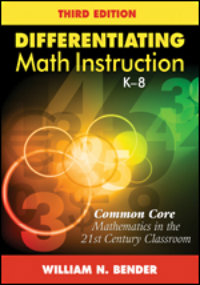Updating Math Differentiation
Differentiating Math Instruction K-8; 3rd edition: Common Core Mathematics in the 21st Century Classroom
By William N. Bender
(Corwin/SAGE, 2013 – Learn more)

In his third edition of Differentiating Math Instruction K-8, William N. Bender has written another winner. If you are teaching math or even another subject, you will find this book helpful. He clearly addresses the topics of differentiation, 21st century skills and the Common Core and gives concrete examples, ideas and resources of how to make them all happen in your classroom.

What else is in the book
The next three chapters of the book focus on specific activities to use to increase a teacher’s level of differentiation. Chapter 4 is designated as “Differentiating Early Math Instruction” (K-2). If you teach a higher grade, like middle school for instance, you might want to think twice before you skip this chapter. Bender gives many examples of ideas and resources that might start being used in the earliest grades, but that can either continue in the later grades, or can be used with older students with only a little modification (usually just a change in the content covered).
For instance, his description of using avatars and “Voki” in the classroom is discussed in this chapter, clearly an engaging tactic for my middle school students. The same is true for the chapter titled “Strategies for Differentiating Instruction in Grades 3-6,” which includes information on how to effectively and safely set up either a class blog or wiki, as well as a number of other strategies.
Chapter 6 is the longest in the book and covers dozens of strategies focused specifically on the middle school (6-8). The strategies presented are tech heavy and tied to both 21st century skills and the Common Core. While Bender may make reference to ideas presented in the earlier chapters, the book does not contain any redundancy, so you might want to give those two chapters on strategies for the lower grades a look if you teach middle school.
Bender then finishes the book with “Differentiated Assessments and Response to Intervention.” He goes through a number of assessment types and discusses their usages. He then presents two RtI case studies, one at the elementary level and the other at the middle school level.
Math anxiety, technology, the Core – it’s all here
Throughout the book Bender also addresses the reality of math anxiety and its role in student engagement and success. He shows where many of the strategies that he has provided help with math anxiety, as well as generally increase student engagement and achievement.
He also does a great job of explaining, demonstrating and tying together: the role of 21st century skills, including the use of collaboration and web 2.0 tools, the Common Core state standards, and the use of both CRA instruction and constructivist theory (projected to be a trend in education in the new year by Jeff Borden).
This book is well-referenced, relying on research based strategies, both old and new, and is packed with useful information for the mathematics classroom.
Laura Von Staden has a Ph.D. in Molecular Immunology and a Master’s in Special Education. She is a Special Education middle school teacher in Tampa, Florida, where she serves on numerous committees both at her school and within her district, works closely with the local university as a master mentor, and facilitates online Professional Development courses as well as a teacher learning community sponsored by her local teacher organization.




































